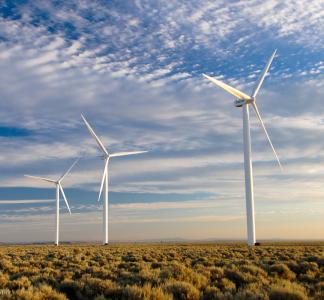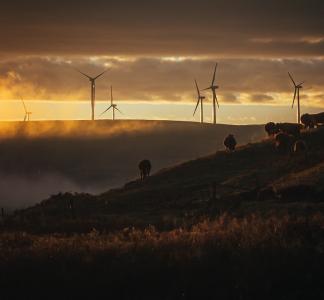5 stories: Resistance in the era of fossil fuels and climate change

Parts of the fossil fuel lifecycle, from extraction to climate disasters
Michael Russo
Oil and gas projects harm climate leading to public health risks, water pollution and fires
This blog post is part of a series on how oil and gas extraction harms community and climate health. In five stories, we talk to community members organizing, rallying and fighting back against the various stages of the fossil fuel "lifecycle," from the point of oil and gas extraction to the climate extremes it creates. Click here to read about the proposed reforms to the oil and gas leasing system on public lands.
-
HARMS OF EXTRACTION - Big Wind, Wyoming
-
REFINERY LEAKS - Erandi Treviño, Texas
-
PIPELINE DANGERS - Crystal Mello, Virginia
-
GAS LEAKS, DROUGHTS AND WILDFIRES - Kajol Gupta, California
-
AIR POLLUTION AND EXTREME HEAT - Jesus Mendoza, Arizona

Big Wind wears their hair down looking straight ahead
HARMS OF EXTRACTION - Big Wind
Big Wind (they/them) is a Two Spirit member of the Northern Arapaho Tribe from the Wind River Reservation in what’s now called central Wyoming—home to dozens of oil and gas fields. On top of leaving industrial waste for nearby communities to deal with, oil and gas companies have spread misinformation in the area’s public education system.
After joining the front lines of the Standing Rock resistance to stop the Dakota Access pipeline, Big Wind continues their work by combating misinformation. Further, they reject the damaging, dominant U.S. cultural narratives that reach back to settler colonialism and still fuel environmental racism. Resisting ways of life that are based on extraction, Big Wind instead promotes a reciprocal relationship with the natural world.
Read more about Big Wind’s journey, including their attendance at COP27 and their tips about diverse ways communities can fight for a healthy future.

Erandi Treviño wears her hair pulled back and smiles
REFINERY LEAKS - Erandi Treviño
Erandi Treviño (she/her) lives in Houston, Texas, home to the largest concentration of oil refineries and petrochemical plants in the U.S. She and her community breathe in toxic benzene fumes, known for causing chronic health problems, from surrounding refineries every day. Treviño is a community organizer and environmental advocate with EcoMadres, a community that works to protect the health of Latino families from air pollution and climate change, and she also leads the Healthy Port Communities Coalition in Houston for Public Citizen.
Latino communities are 165 percent more likely than non-Latino whites to live in counties with unhealthy levels of particulate matter pollution, and Treviño addresses the root causes of this issue, including racist city planning and systemic wealth gaps in Houston.
Read more about how Treviño is working to put her community above industry and ensure the right to clean air for all.

Crystal Mello wears a tie-dye shirt and smiles for the camera
Sarah Hazelgrove
PIPELINE DANGERS - Crystal Mello
Crystal Mello (she/her) lives in a small-town community in the Appalachian Mountains of Virgina. There, she spends most of her days resisting the construction of the Mountain Valley Pipeline, a pipeline that poses many environmental risks.
Mello's activism employs everything from canvassing her community to attending board meetings and engaging in tree sits. Her efforts are geared toward giving her community a voice in creating a more just, sustainable future.
Read more about Crystal Mello's thoughts on the importance of relationship-building and utilizing a diversity of tactics for resisting the Mountain Valley Pipeline.

Kajol Gupta smiles while standing next to sunflowers
GAS LEAKS, DROUGHT & WILDFIRES - Kajol Gupta
As a kid, Kajol Gupta (she/her) had to evacuate her town just north of Los Angeles more than once due to wildfires, often returning to find an eerie, burned version of her neighborhood. She and her community were also exposed to methane, ethane and other toxic chemicals due to a massive gas storage facility leak. Her experience with these environmental emergencies inspired her to pursue studies in conservation and resources and work with rural farming communities facing the ongoing drought.
In her scientific work, Gupta emphasizes the need for engaging with a diverse set of perspectives to create equitable solutions to environmental challenges. Today, she is pursuing a master’s degree in freshwater and coastal ecosystem management at the Yale School of the Environment, where she furthers her learning on equitable management of water in a changing climate.
Read more about her thoughts on the importance of interdisciplinarity in addressing the climate crisis.

Jesus Mendoza smiles while wearing camera gear
Ironwood Tree Experience
AIR POLLUTION AND EXTREME HEAT - Jesus Mendoza
When 16-year-old Jesus Mendoza (he/him) moved from Las Vegas to Tuscon, he instantly noticed how the cleaner air improved his asthma. The experience inspired him to advocate for clean air in his community. He was able to do so as an intern with the Ironwood Tree Experience’s Youth for Blue Skies Program, which encourages youth to explore community action through storytelling. In learning more about issues people face with air pollution, he became an advocate for public transportation as a way to combat the issue.
Tucson experiences extreme heat, and trees are more prevalent in affluent neighborhoods than in those with majority people of color. In his work with Tucson Clean and Beautiful, Mendoza also works to promote shade equity in the city by helping plant trees, with a goal to plant 1 million trees by 2030.
Read more about how Mendoza is using his story to inspire others to fight for a positive and sustainable future.






